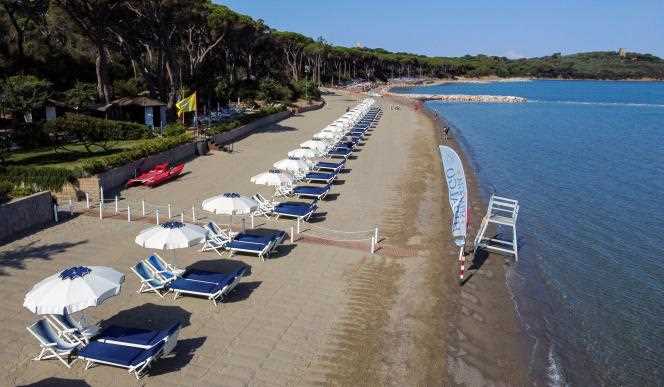It is an open pit gold mine, a considerable source of resources from which the Italian State has always received nothing but trifles. Endowed by nature with more than 8,000 kilometers of coastline, including approximately 5,000 beaches invaded each summer by millions of tourists, Italy has, for several decades, chosen to favor private beaches.
Today, concession operators occupy a little less than half (43%) of the available space (including almost all of the most attractive areas), and the volume of activity they generate season, from May to September, is estimated at more than 15 billion euros, a large part of which escapes all forms of VAT. Revenues for the Italian State? Only 115 million euros, from concessions granted without a call for tenders and with rent amounts notoriously disconnected from reality, sometimes exploited for generations by the same family.
The overwhelming report has been made a thousand times, and all attempts at reform have failed, because of the explosive nature of this subject. What political leader would dare to run the risk of a strike movement by beach attendants throughout the territory, what is more in a pre-election year? Who would tackle this sacred moment in the life of Italian families that is the beach holiday?
This calculation has prompted successive governments not to follow up on the European Bolkestein directive, named after the European commissioner who proposed and supported it, and which has required the country, since 2006, to implement the opening up to competition. of this sector. Despite two infringement procedures against Italy, all have decided to stay. Also, Mario Draghi’s decision to tackle the problem represents a turning point. By a decree published on February 16, the council announced that the current concessions, which the first Conte government (June 2018-September 2019) had extended until 2033, would end on December 31, 2023, and that calls for tenders would be opened in the wake, at the level of the communes, according to methods which will be defined within six months.
Hostility to standards imposed by Brussels
“This is a reform that Europe has been asking for fifteen years, and that nobody wanted to implement. Mario Draghi doesn’t want to run for office, he’s not a candidate for anything, so he decided to tackle it”, summarizes one of his advisers. This announcement did not fail to provoke strong resistance among all the political forces, which all have officials directly or indirectly linked to this flourishing and little regulated activity.
You have 61.47% of this article left to read. The following is for subscribers only.
